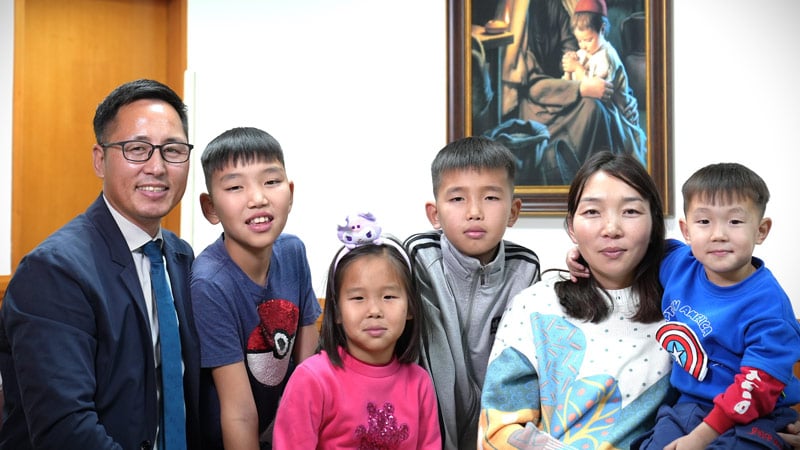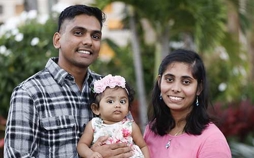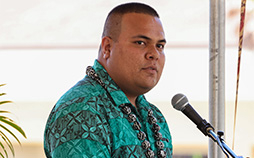For Time and All Eternity
For Balu Pilli of India, coming to BYU–Hawaii not only blessed him with an education but also an eternal family.
January 2024

“There is a big difference from where I was to where I am now,” says Nasanbold Sukhbaatar, a BYU–Hawaii alum from the Dornod province of Mongolia. “I grew up as a farmer boy, and now I am the Church Communication Department director for Mongolia.”
Growing up, Nasanbold left school in the fourth grade to work on his family’s farm and did not receive further education until his aunt made sure he returned to school for the ninth grade. Nasanbold became passionate about learning and worked hard to catch up to his peers. He graduated from high school and attended college in Mongolia.
Following his bachelor’s degree, Nasanbold served a mission and started a family with his wife, Otgonchimeg. As new parents, they struggled financially and could not cover their basic expenses. Nasanbold found it hard to obtain higher positions since he did not speak English and was not educated in a foreign country. The couple realized that, unless they could start a new path, life was going to become increasingly difficult.
The Sukhbaatars prayed for educational opportunities and discovered BYU–Hawaii’s IWORK program. To prepare themselves to apply, Nasanbold and Otgonchimeg both took English classes online from the university and started saving money for plane tickets.“The journey to BYU–Hawaii took five years of preparation,” says Nasanbold. He and Otgonchimeg were both accepted to BYU–Hawaii and the IWORK program. He majored in hospitality and tourism management, and she majored in social work. As part of the IWORK program, both worked at the Polynesian Cultural Center—Nasanbold as an ambassador guide, Otgonchimeg at concessions.
“We had a lot of peoples’ hands in our lives during our time at BYU–Hawaii,” Nasanbold says. “From our fellow Mongolian students who watched our kids while we studied, to the donors who helped support the IWORK program—and, of course, our Heavenly Father. Without this help, it would not have been possible to finish our degrees.”
Otgonchimeg and Nasanbold felt strongly about returning to Mongolia and using their degrees to help their people. After staying in Laie for a few more years to gain more work experience, Nasanbold moved his family back to Mongolia and the countryside where he grew up. He started his own farm business and managed it for a few years until he was offered a job as the director of the Church Communication Department for Mongolia.
Nasanbold always wanted to find a way to serve others to show his appreciation for the help he and his wife had been given. “I get to represent the Church for Mongolia,” he says. “It means so much to me to be able to help build His kingdom this way.”
Nasanbold is humbled by how BYU–Hawaii changed his life. He says, “The IWORK program made everything that has happened possible. When my wife and I were at BYU–Hawaii, there were around 30 Mongolian students, and now it’s closer to 70. This means 70 lives are changing. IWORK is making it possible for so many more students to be influential in their home countries like I am doing now.”

For Balu Pilli of India, coming to BYU–Hawaii not only blessed him with an education but also an eternal family.

Temwake is taking the knowledge he’s gained at BYUH and helping improve his country through regenerative tourism.

Peniasi’s journey was not easy. Now that he has graduated from BYU–Hawaii, he is determined to help those who face similar challenges.